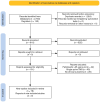Effects of repetitive transcranial magnetic stimulation in children and young people with psychiatric disorders: a systematic review
- PMID: 38809301
- PMCID: PMC11868357
- DOI: 10.1007/s00787-024-02475-x
Effects of repetitive transcranial magnetic stimulation in children and young people with psychiatric disorders: a systematic review
Abstract
Repetitive transcranial magnetic stimulation (rTMS) has demonstrated benefits in adults with psychiatric disorders, but its clinical utility in children and young people (CYP) is unclear. This PRISMA systematic review used published and ongoing studies to examine the effects of rTMS on disorder-specific symptoms, mood and neurocognition in CYP with psychiatric disorders. We searched Medline via PubMed, Embase, PsychINFO via OVID, and Clinicaltrials.gov up to July 2023. Eligible studies involved multiple-session (i.e., treatment) rTMS in CYP (≤ 25 years-old) with psychiatric disorders. Two independent raters assessed the eligibility of studies and extracted data using a custom-built form. Out of 78 eligible studies (participant N = 1389), the majority (k = 54; 69%) reported an improvement in at least one outcome measure of disorder-specific core symptoms. Some studies (k = 21) examined rTMS effects on mood or neurocognition,: findings were largely positive. Overall, rTMS was well-tolerated with minimal side-effects. Of 17 ongoing or recently completed studies, many are sham-controlled RCTs with better blinding techniques and a larger estimated participant enrolment. Findings provide encouraging evidence for rTMS-related improvements in disorder-specific symptoms in CYP with different psychiatric disorders. However, in terms of both mood (for conditions other than depression) and neurocognitive outcomes, evidence is limited. Importantly, rTMS is well-tolerated and safe. Ongoing studies appear to be of improved methodological quality; however, future studies should broaden outcome measures to more comprehensively assess the effects of rTMS and develop guidance on dosage (i.e., treatment regimens).
Keywords: Children; Psychiatric disorders; Systematic review; Young people; rTMS.
© 2024. The Author(s).
Conflict of interest statement
Declarations. Conflict of interest: The authors declare no conflict of interest.
Figures
Similar articles
-
Non-invasive brain stimulation techniques for chronic pain.Cochrane Database Syst Rev. 2018 Mar 16;3(3):CD008208. doi: 10.1002/14651858.CD008208.pub4. Cochrane Database Syst Rev. 2018. Update in: Cochrane Database Syst Rev. 2018 Apr 13;4:CD008208. doi: 10.1002/14651858.CD008208.pub5. PMID: 29547226 Free PMC article. Updated.
-
Non-invasive brain stimulation techniques for chronic pain.Cochrane Database Syst Rev. 2018 Apr 13;4(4):CD008208. doi: 10.1002/14651858.CD008208.pub5. Cochrane Database Syst Rev. 2018. PMID: 29652088 Free PMC article.
-
Repetitive transcranial magnetic stimulation for tinnitus.Cochrane Database Syst Rev. 2011 Oct 5;(10):CD007946. doi: 10.1002/14651858.CD007946.pub2. Cochrane Database Syst Rev. 2011. PMID: 21975776
-
Non-pharmacological interventions for improving language and communication in people with primary progressive aphasia.Cochrane Database Syst Rev. 2024 May 29;5(5):CD015067. doi: 10.1002/14651858.CD015067.pub2. Cochrane Database Syst Rev. 2024. PMID: 38808659 Free PMC article.
-
Methylphenidate for children and adolescents with attention deficit hyperactivity disorder (ADHD).Cochrane Database Syst Rev. 2015 Nov 25;2015(11):CD009885. doi: 10.1002/14651858.CD009885.pub2. Cochrane Database Syst Rev. 2015. Update in: Cochrane Database Syst Rev. 2023 Mar 27;3:CD009885. doi: 10.1002/14651858.CD009885.pub3. PMID: 26599576 Free PMC article. Updated.
Cited by
-
The Use of MRI and TMS in Treatment-Resistant Depression: Advances in Pediatric Applications.Brain Sci. 2025 Feb 14;15(2):194. doi: 10.3390/brainsci15020194. Brain Sci. 2025. PMID: 40002526 Free PMC article. Review.
-
rTMS for the treatment of psychiatric disorders: a review about training courses and materials and the presentation of the training materials of the German Society for Brain Stimulation in Psychiatry.Front Psychiatry. 2025 Aug 8;16:1490039. doi: 10.3389/fpsyt.2025.1490039. eCollection 2025. Front Psychiatry. 2025. PMID: 40859938 Free PMC article. Review.
References
-
- Belfer ML (2008) Child and adolescent mental disorders: the magnitude of the problem across the globe. J Child Psychol Psychiatry 49(3):226–236. 10.1111/j.1469-7610.2007.01855.x - PubMed
-
- Kieling C, Baker-Henningham H, Belfer M, Conti G, Ertem I, Omigbodun O, Rohde LA, Srinath S, Ulkuer N, Rahman A (2011) Child and adolescent mental health worldwide: evidence for action. Lancet 378(9801):1515–1525. 10.1016/S0140-6736(11)60827-1 - PubMed
-
- Polanczyk GV, Salum GA, Sugaya LS, Caye A, Rohde LA (2015) Annual Research Review: a meta-analysis of the worldwide prevalence of mental disorders in children and adolescents. J Child Psychol Psychiatry 56(3):345–365. 10.1111/jcpp.12381 - PubMed
-
- Ravens-Sieberer U, Erhart M, Devine J, Gilbert M, Reiss F, Barkmann C, Siegel NA, Simon AM, Hurrelmann K, Schlack R, Hölling H, Wieler LH, Kaman A (2022) Child and adolescent Mental Health during the COVID-19 pandemic: results of the three-Wave Longitudinal COPSY Study. J Adolesc Health 71(5):570–578. 10.1016/j.jadohealth.2022.06.022 - PMC - PubMed
Publication types
MeSH terms
Grants and funding
LinkOut - more resources
Full Text Sources
Medical


